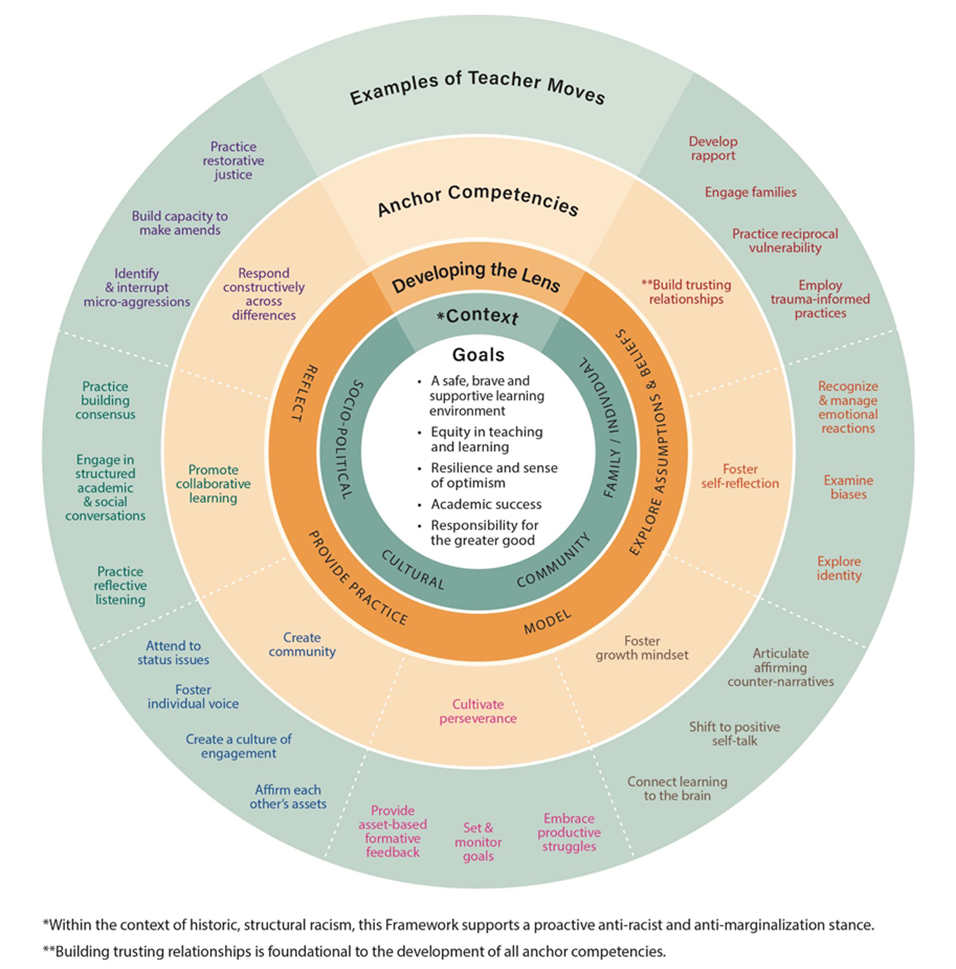Social and Emotional Learning
Teachers play a significant role in helping create the kind of classroom environment that promotes social-emotional learning (SEL) and positive social-emotional development among students through integration of SEL curricula and building safe and supportive learning environments. As we’ve learned nationally during the COVID-19 pandemic, schools are critical in our communities to supporting children and their families. Teachers need to be prepared to manage daily stressors within contemporary school settings that directly impact their well-being and the social-emotional development of students.
Vision for SEL
TSPC, in partnership with Oregon’s Educator Preparation Programs, envisions a state in which all preservice educators graduate prepared to serve their students, classrooms and school community as authentic, self-aware, caring and engaged life-long learners who collaborate to achieve their goals and contribute to more inclusive, positive, just and equitable systems (modified from CASEL, 2020). These systems will be culturally responsive, trauma-informed and foster the unique identities of the educators and students within them.
Guiding Principles
- Asset-Framing Mindset
- Universal
- Rooted in Climate & Culture Development
- Integrated
- Equity
- Understanding Implicit Bias In Self And Others
- Recognizing Systemic (In)Equities
- Leading With Empathy
- Self-Reflection
- Relationships & Community
- Inclusive
- Caring
- Growth-Promoting
- Reciprocal & Mutual
- Transformational Growth
- Collaborative
- Intentional
- Consistent
- Continuous
Framework
We at TSPC see the implementation of SEL through the lens of two frameworks simultaneously: CASEL for supporting social and emotional competency development of K-12 students and adults, and the Social, Emotional and Cultural Competencies Framework, created by the CRTWC, for enhancing an educator’s own competencies and implementing SEL practices within the classroom.


Standards
Standards The standards below are based on the CASEL framework competencies including focal constructs. It should be acknowledged that these standards have a long history of being implemented in a compliance-focused way that did not always consider the complexity and depth of identity that students and educators are bringing into schools and districts. However, we believe that the evidence base behind these standards should not be disregarded and should, instead, be reflected upon with an equity lens, considering the context and structures impacting them. EPPs, in implementing these five standards, should prioritize the skills and abilities identified within each competency that they believe are the most critical for preparing educators to enter the Oregon PreK-12 school system. Each EPP will have their own take on these competencies and that is what makes Oregon educator preparation unique. The critical feature of these standards is how they are implemented in classrooms and schools.
Standard 1: Self-Awareness |
Using a lens of examining personal identity, the EPP will ensure that faculty, staff and candidates Recognize and examine personal, cultural and linguistic assets and other social markers that may influence identity development and emotion regulation as it relates to one's culture, family of origin, and historical experiences Recognize unexamined prejudices and biases through personal reflection by linking feelings, values and thoughts of one's identity as an educator including their relationship as an educator on larger systems (e.g. classroom, school, community) Examine self-efficacy in order to develop professional identity and dispositions which enhance one’s capacity to execute behaviors that demonstrate respect for different people, places and contexts
|
Standard 2: Self-Management
|
Using a lens of fostering agency, the EPP will ensure that faculty, staff and candidates
Demonstrate competence in self-regulation strategies including identifying personal and professional stressors, and having the discipline to recognize and express emotions appropriately in a professional setting Continuously examine their own practice, sense of agency, initiative, and utilization of a growth mindset to explore areas of professional development Utilize planning and organizational skills to set and achieve personal, professional and collective goals and proactively seek help from key partners to achieve those goals
|
Standard 3: Social-Awareness
|
Using a lens of cultivating belonging, the EPP will ensure that faculty, staff and candidates
Acknowledge the value in others’ perspectives including their assets and strengths Identify opportunities to express gratitude and model empathy in situationally appropriate ways that promote a healthy understanding of emotions and feelings within shared environments Understand the influence that organizations, systems and social norms, including those that are historically oppressive or unjust, have on attitudes, beliefs and behavior
|
Standard 4: Relationship Skills
|
Using a lens of collaborative problem-solving, the EPP will ensure that faculty, staff and candidates
Develop and foster positive professional relationships while recognizing the importance of work-life harmony and the impact of compassion fatigue on burnout and support-seeking behaviors Communicate effectively, resolve conflicts constructively and demonstrate group leadership when appropriate Use available power and privilege to elevate and amplify the voices of those who have been historically underserved by the education system by acknowledging and recognizing multiple ways of being and knowing
|
Standard 5: Responsible Decision-Making
|
Using a lens of stimulating curiosity, the EPP will ensure that faculty, staff and candidates
Analyze available information, data and facts in order to find reasonable and feasible solutions to personal and social problems Utilize critical thinking skills in order to anticipate and evaluate the consequences of actions and attitudes, including implications for school and community outcomes Identify their scope of influence and impact by reflecting on their own role as an agent of change to promote personal and community well-being
|
Read More About SEL
Educator Social and Emotional Development
K-12 Social and Emotional Learning